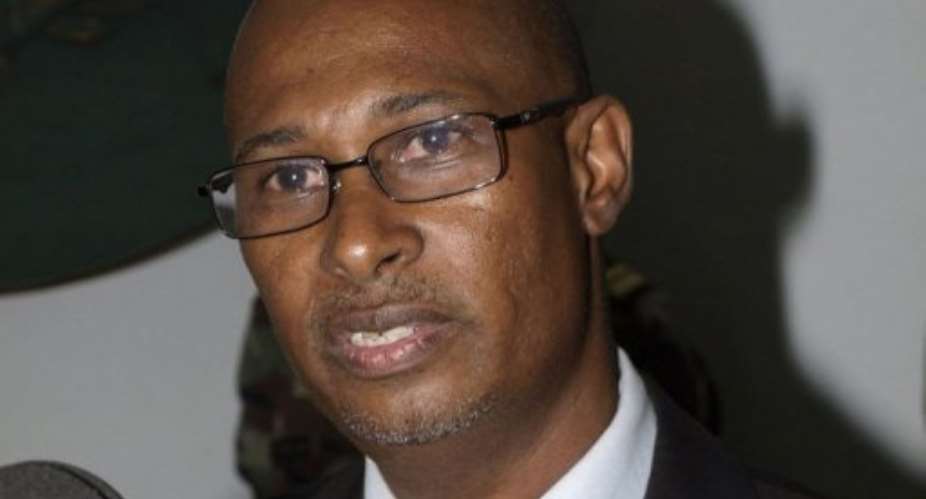BISSAU (AFP) - Some 70 soldiers of a west African force arrived Thursday in Guinea-Bissau on a mission to restore stability after the country's April 12 coup, as the prime minister of a transitional government took office.
The soldiers from Burkina Faso arrived just after the Economic Community of West African states (ECOWAS) announced it was deploying a force of 629 troops to Guinea-Bissau "to relieve the Angolan military personnel (and) support the restoration of constitutional rule."
The soldiers who ousted Guinea-Bissau's government last month cited the 600-strong Angolan force, part of a 2010 defence cooperation agreement between the two countries, as a reason for their coup.
They claimed the Angolan troops were conspiring with the Bissau government against the army, which for years has had tense relations with civilian leaders in the chronically unstable west African state.
The first west African troops were welcomed by officers from Guinea Bissau's police and army as well as representatives of the United Nations and ECOWAS.
Speaking at his swearing-in ceremony the same day, transitional Prime Minister Rui Duarte Barros pledged not to jail ex-prime minister Carlos Gomes Junior or former interim president Raimundo Pereira, who said Wednesday at a press conference that they do not recognise the transitional government.
"We are going to guarantee security for everyone and there will not be any prosecutions, because this country belongs to all of us," Barros said.
Both Pereira, who came to power after the death of president Malam Bacai Sanha in January, and Gomes, who had been the favourite to win a presidential election aborted by his overthrow, were arrested during the coup and have sought refuge abroad since their release two weeks later.
Transitional President Manuel Serifo Mhamadjo, who nominated Barros on Wednesday, called on the new prime minister to "create a space for dialogue" and recommended he commission "an independent audit of the management of the country and the last presidential election".
The coup interrupted the election between the first and second round.
Mhamadjo, who was accompanied at the swearing-in ceremony by the mastermind of the coup, army chief Antonio Indjai, was the putschists' choice to lead the transitional government -- a pick ECOWAS finally accepted despite its condemnation of the coup.
But the West African bloc's military force will be ramping up its presence as the transitional government starts its work.
Another contingent of soldiers from Nigeria is due to join the force Friday. Senegal has also promised to take part.
The force is based at a barracks in Cumere, 35 kilometres (22 miles) from the capital.
The new government comes after putschists and 35 political parties signed an agreement on a transition period of one year until fresh elections.
Since independence from Portugal in 1974, Guinea-Bissau's army and state have remained in constant, often deadly, conflict, and no president has ever completed a full term in office.
The country has also become a hub for drug-running between South America and Europe.





 Tuesday’s downpour destroys ceiling of Circuit Court '8' in Accra
Tuesday’s downpour destroys ceiling of Circuit Court '8' in Accra
 SOEs shouldn't compromise on ethical standards, accountability – Akufo-Addo
SOEs shouldn't compromise on ethical standards, accountability – Akufo-Addo
 Father of 2-year-old boy attacked by dog appeals for financial support
Father of 2-year-old boy attacked by dog appeals for financial support
 Jubilee House National Security Operative allegedly swindles businessman over sa...
Jubilee House National Security Operative allegedly swindles businessman over sa...
 Nobody can order dumsor timetable except Energy Minister – Osafo-Maafo
Nobody can order dumsor timetable except Energy Minister – Osafo-Maafo
 Mahama wishes National Chief Imam as he clock 105 years today
Mahama wishes National Chief Imam as he clock 105 years today
 J.B.Danquah Adu’s murder trial: Case adjourned to April 29
J.B.Danquah Adu’s murder trial: Case adjourned to April 29
 High Court issues arrest warrant for former MASLOC Boss
High Court issues arrest warrant for former MASLOC Boss
 Align academic curriculum with industry needs — Stanbic Bank Ghana CEO advocates
Align academic curriculum with industry needs — Stanbic Bank Ghana CEO advocates
 Election 2024: We'll declare the results and let Ghanaians know we've won - Manh...
Election 2024: We'll declare the results and let Ghanaians know we've won - Manh...
